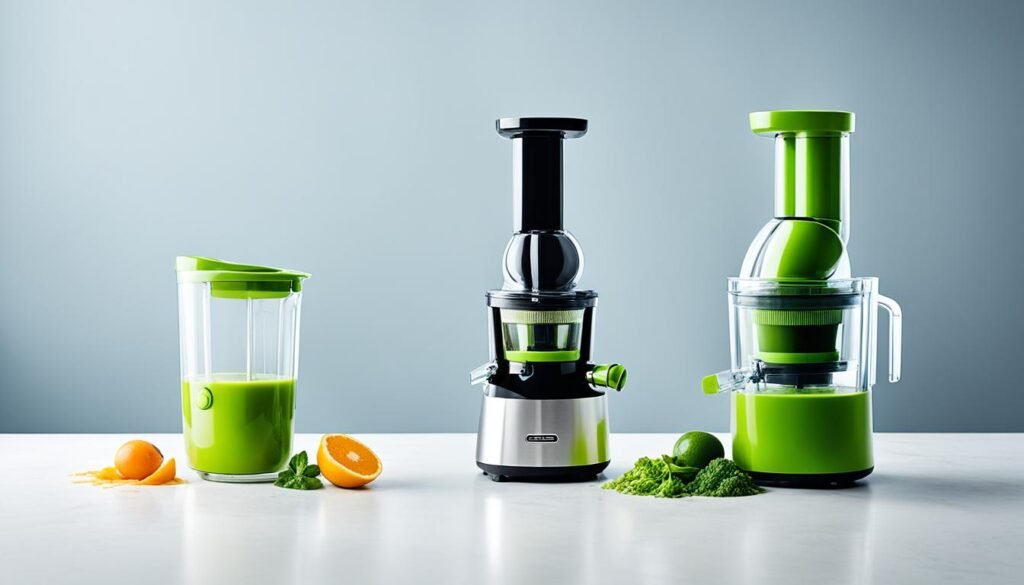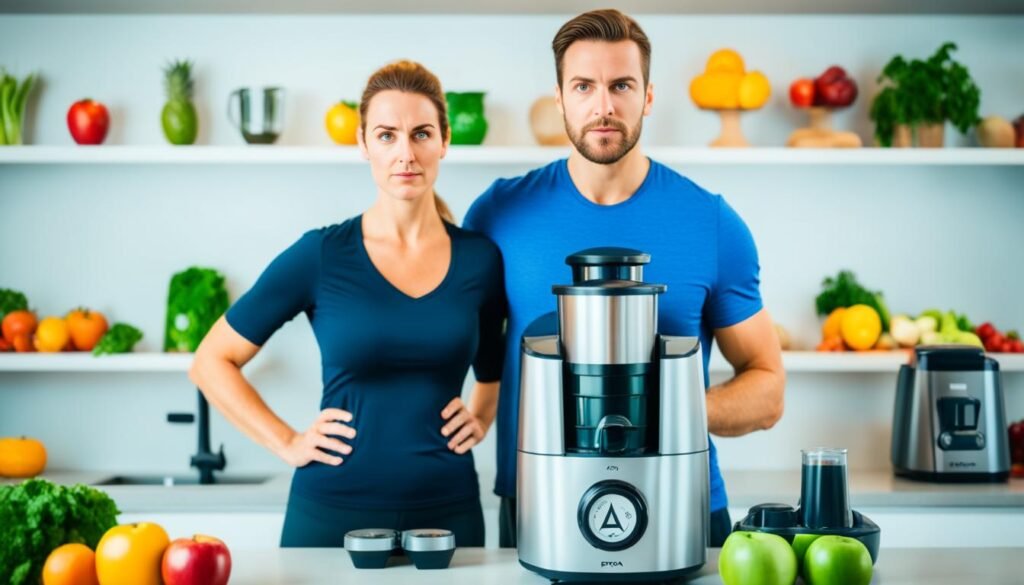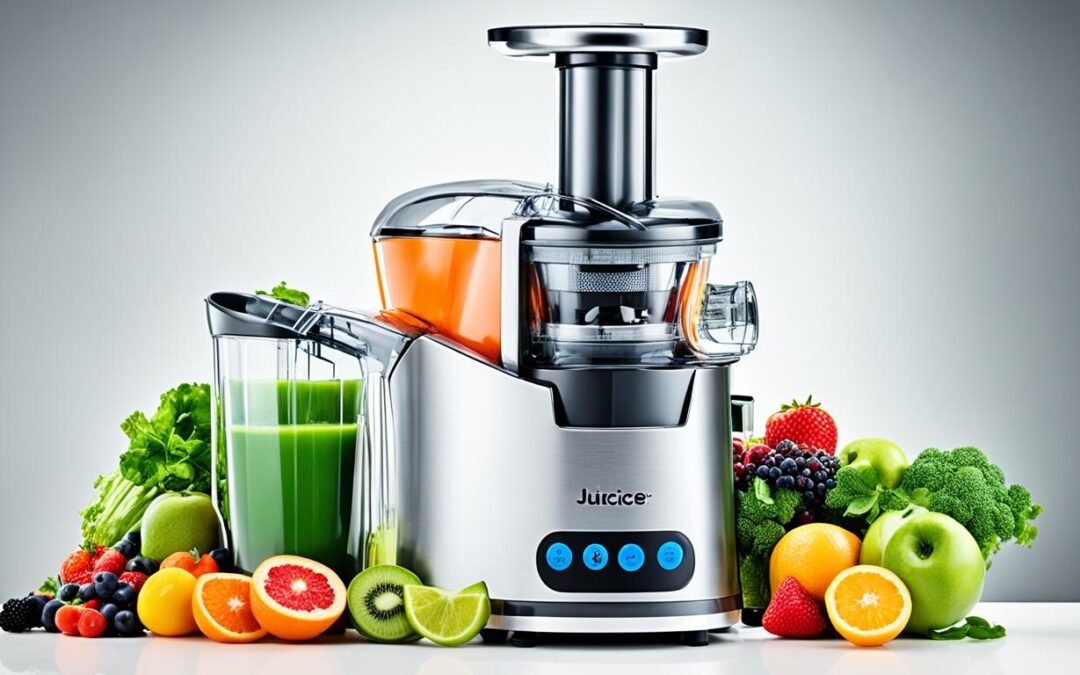Welcome to the exciting world of juicing, where vibrant flavors and nutrient-rich goodness come together. But have you ever considered the potential health risks lurking in your juicing routine? In this article, we’ll explore why Health First should be your priority when it comes to juicers, focusing on the importance of BPA-free materials for a toxin-free juicing experience.
When you embark on a juicing journey, it’s crucial to choose the right equipment that aligns with your health goals. A BPA-free juicer can make a significant difference in preserving the purity and nutritional value of your juices. Let’s delve into the many reasons why BPA-free materials should be on your juicing checklist.
The Health Benefits of Safe Juicing
When it comes to juicing, not only is taste important, but the health benefits are a major factor to consider. Safe juicing practices that prioritize the use of BPA-free materials in juicers can significantly enhance the nutritional value of the juices.
Here are some key health benefits of safe juicing:
- Increased Nutrient Intake: Safe juicing enables you to consume a higher volume of fruits and vegetables, providing a concentrated dose of essential vitamins, minerals, and antioxidants.
- Improved Digestion: Freshly extracted juices are easier for your body to digest, allowing for better absorption of nutrients and aiding in digestion.
- Boosted Immunity: Juices packed with vitamins C and E, as well as powerful antioxidants, can help strengthen your immune system, protecting you from common illnesses and infections.
- Enhanced Hydration: Juices are a fantastic way to stay hydrated, especially during warmer months. They provide a refreshing and delicious alternative to sugary beverages.
- Detoxification: The natural enzymes, antioxidants, and fiber present in juices support the body’s detoxification process, helping to eliminate toxins and cleanse the system.
To truly harness these health benefits, it’s essential to invest in a juicer that prioritizes safe and toxin-free juicing. BPA-free materials in juicers play a significant role in preserving the integrity of the juices.
Image:
Understanding BPA and Its Risks
In this section, we will delve into a deeper understanding of BPA (Bisphenol A) and the potential risks associated with its exposure. It is important to comprehend the risks associated with BPA in order to make informed decisions about the juicers we use. By avoiding BPA in juicers, we can minimize the potential health risks and prioritize our well-being.
What is BPA?
BPA is a chemical compound commonly used in the production of plastic products, including certain juicers. It acts as a building block in the creation of polycarbonate plastics and epoxy resins, providing strength and durability to these materials. BPA can also be found in the lining of food and beverage cans.
The Risks of BPA
BPA has been a topic of concern due to its potential adverse effects on human health. Several studies have linked BPA exposure to various health risks, including:
- Endocrine Disruption: BPA has been found to mimic the hormone estrogen in the body, potentially interfering with the endocrine system and leading to hormonal imbalances.
- Developmental Issues: Research suggests that exposure to BPA during critical developmental stages, such as pregnancy and early childhood, may contribute to behavioral problems, reproductive disorders, and impaired brain development in infants and children.
- Cancer Risk: Some studies have indicated a possible association between BPA exposure and an increased risk of breast and prostate cancers.
- Cardiovascular Effects: Emerging evidence suggests that BPA exposure may negatively impact cardiovascular health, potentially contributing to hypertension and other heart-related conditions.
Avoiding BPA in Juicers
To minimize the potential risks associated with BPA, it is crucial to choose juicers that are made with BPA-free materials. By opting for BPA-free juicers, we can ensure that our freshly extracted juices are free from this potentially harmful chemical compound.
| BPA Exposure Routes | Precautions to Minimize Exposure |
|---|---|
| Food and Beverages: | Choose BPA-free containers, avoid microwaving plastic containers, and opt for fresh or packaged food in BPA-free packaging. |
| Canned Foods: | Look for BPA-free canned foods or choose fresh alternatives. |
| Plastic Products: | Use BPA-free water bottles, food storage containers, and utensils. |
| Thermal Paper: | Minimize contact with thermal paper receipts, and wash hands thoroughly after handling them. |
Note: BPA exposure can occur through various routes. Taking precautions such as choosing BPA-free containers, using fresh or packaged food in BPA-free packaging, and minimizing contact with thermal paper can help reduce exposure.
“By understanding the risks associated with BPA, we can take proactive steps to prioritize our health by using BPA-free juicers.”
The Importance of BPA-Free Materials in Juicers
When it comes to juicing, ensuring the quality and safety of your juices should be a top priority. One crucial aspect of this is the use of BPA-free materials in juicers. BPA, or Bisphenol A, is a chemical commonly found in plastics and can potentially leach into the juices during the juicing process.

BPA is a known endocrine disruptor that can mimic hormones in the body and has been linked to various health concerns, including hormonal imbalance, infertility, and even certain cancers. By choosing juicers made with BPA-free materials, you can minimize the risk of exposure to this harmful chemical and enjoy the benefits of fresh, toxin-free juices.
The Benefits of BPA-Free Materials
Opting for juicers made with BPA-free materials brings several advantages:
- Healthier Juices: Using BPA-free materials helps preserve the integrity of the juices by preventing any potential contamination from harmful chemicals. This ensures that you are consuming pure, nutrient-rich juices.
- Peace of Mind: Knowing that your juicer is free from BPA provides peace of mind, allowing you to focus on the enjoyment and health benefits of juicing without worrying about potential health risks.
- Long-Term Safety: By investing in a BPA-free juicer, you are making a long-term investment in your health. BPA-free materials are designed to withstand regular use, ensuring that your juicing experience remains safe and free from harmful chemicals.
“Choosing a juicer made with BPA-free materials is a proactive step towards promoting a healthy lifestyle and reducing exposure to harmful chemicals.”
When selecting a juicer, be sure to check the product specifications and look for labels or certifications indicating that it is made with BPA-free materials. This will help you make an informed choice and prioritize your health, allowing you to enjoy the benefits of fresh, delicious juices without compromising your well-being.
Choosing the Right BPA-Free Juicer
When it comes to selecting a juicer, it is essential to prioritize your health by choosing one that is made with BPA-free materials. BPA, or Bisphenol A, is a chemical commonly found in plastics that can be harmful to your well-being if ingested.
Fortunately, many juicer manufacturers now offer models that are specifically designed with BPA-free materials. These juicers provide a safer alternative, ensuring that your freshly made juices remain free from any potential toxins.
When considering which BPA-free juicer to purchase, there are a few key factors to keep in mind to make an informed decision:
- Quality: Look for juicers that are built with high-quality materials to ensure durability and longevity.
- Efficiency: Consider the juicer’s extraction capabilities and its ability to extract maximum juice from fruits and vegetables.
- Features: Assess the additional features that the juicer offers, such as variable speed settings, multiple juicing modes, or easy cleaning mechanisms.
- Customer reviews: Read reviews from other customers to gain insights into their experiences with different BPA-free juicer models.
Choosing a juicer made with BPA-free materials ensures that you can enjoy your fresh juices while minimizing any potential health risks associated with BPA exposure.
Remember, investing in a high-quality, BPA-free juicer not only promotes your health but also contributes to a more sustainable lifestyle by reducing your exposure to harmful chemicals and supporting environmentally friendly practices.
By following these guidelines and selecting a BPA-free juicer, you can confidently enjoy the benefits of juicing without compromising your well-being.

Steps to Ensure Toxin-Free Juicing
When it comes to toxin-free juicing, there are several important steps and precautions you can take to ensure a healthier and safer juicing experience. By following these guidelines, you can maximize the benefits of juicing while minimizing potential risks. Here are some key steps to consider:
1. Choose a BPA-Free Juicer
To start your toxin-free juicing journey, it is crucial to select a juicer that is made with BPA-free materials. BPA (Bisphenol A) is a harmful chemical that can leach into juices and pose risks to your health. Opting for a BPA-free juicer will help eliminate this potential source of contamination.
2. Clean and Maintain Your Juicer Regularly
Keeping your juicer clean and well-maintained is essential for toxin-free juicing. After each use, thoroughly wash all removable parts of the juicer with warm, soapy water. Ensure that you clean hard-to-reach areas, such as crevices and mesh screens, to prevent the buildup of bacteria and mold. Regular maintenance will help maintain the quality and safety of your juicer.
3. Use Organic Produce
Opt for organic fruits and vegetables when preparing your juices. Organic produce is grown without the use of synthetic pesticides, herbicides, or fertilizers, reducing the risk of toxins in your juice. By using organic ingredients, you can enjoy the benefits of juicing while minimizing exposure to harmful substances.
4. Avoid Cross-Contamination
To prevent cross-contamination and maintain a toxin-free juicing environment, ensure that you clean your cutting board, knives, and other utensils thoroughly before and after juicing. Avoid using the same surfaces and tools for raw meat and produce, as this can introduce harmful bacteria and contaminants into your juices.
To give you a visual representation of these steps, take a look at the table below:
| Steps to Ensure Toxin-Free Juicing |
|---|
| Choose a BPA-Free Juicer |
| Clean and Maintain Your Juicer Regularly |
| Use Organic Produce |
| Avoid Cross-Contamination |
Remember, following these steps will help you create delicious and nutritious juices that are free from harmful toxins. By prioritizing your health and well-being, you can enjoy the many benefits of toxin-free juicing.
Embracing a Healthy Lifestyle through Juicing
Juicing is not just a trend; it’s a powerful tool that can help you embrace a healthy lifestyle. By incorporating fresh, homemade juices into your daily routine, you can nourish your body with essential nutrients and promote overall well-being and vitality. And to ensure that you’re getting the most out of your juicing experience, it’s important to choose the right juicer, one that is made with BPA-free materials.
Why is this important? Well, BPA, or Bisphenol A, is a harmful chemical commonly found in plastics, including some juicer components. Research has shown that BPA can leach into food and beverages, especially when exposed to heat or acidic conditions. This means that if you’re using a juicer made with materials containing BPA, you could be unknowingly exposing yourself to this harmful chemical.
By opting for a juicer made with BPA-free materials, you can eliminate this risk and enjoy the full benefits of juicing. Not only will you be able to create delicious and nutritious juices, but you’ll also be taking a proactive step towards safeguarding your health.
“Juicing with a BPA-free juicer allows you to prioritize your health and well-being while enjoying the natural goodness of fresh, homemade juices.”
Whether you’re new to juicing or have been doing it for a while, investing in a BPA-free juicer is a smart choice. Not only does it offer peace of mind in terms of health and safety, but it also ensures that you’re getting the maximum nutritional value from your fruits and vegetables.
So, how do you go about choosing the right juicer? Here are a few factors to consider:
- Quality: Look for a juicer that is well-built and durable, as this will ensure that it lasts for a long time and handles the demands of daily juicing.
- Efficiency: Consider the juicer’s extraction efficiency, as this will determine how well it extracts juice from fruits and vegetables, leaving behind minimal waste.
- Size and Design: Choose a juicer that fits your kitchen space and lifestyle. Whether you prefer a compact juicer for easy storage or a larger one with multiple functions, there is a BPA-free juicer that suits your needs.
Remember, juicing is not just about drinking delicious and refreshing juices; it’s about embracing a healthy lifestyle. By making the conscious choice to use a BPA-free juicer, you’re taking a step towards nurturing your body and optimizing your well-being.
| Benefits of Embracing a Healthy Lifestyle through Juicing |
|---|
| 1. Increased intake of vitamins and minerals |
| 2. Improved digestion and gut health |
| 3. Strengthened immune system |
| 4. Enhanced hydration |
| 5. Added antioxidants for anti-aging benefits |
| 6. Detoxification and cleansing of the body |
| 7. Weight management and increased energy levels |
| 8. Stronger hair, skin, and nails |
| 9. Reduced risk of chronic diseases |
As you can see, the benefits of embracing a healthy lifestyle through juicing are numerous and far-reaching. So, why wait? Start your juicing journey today with a BPA-free juicer and experience the transformative power of fresh, homemade juices.
The Role of BPA-Free Materials in Sustainability
When it comes to juicing, not only is it important to prioritize your health but also to consider the impact of your choices on the environment. That’s where the role of BPA-free materials in juicers aligns perfectly with sustainability efforts.
BPA-free materials are safer for both your personal health and the environment. BPA, or Bisphenol A, is a chemical found in many plastics and can be harmful when it leaches into food and beverages, including juices. By opting for juicers made with BPA-free materials, you can enjoy your fresh and nutritious juices without worrying about potential health risks associated with BPA exposure.
“Choosing a juicer made with BPA-free materials contributes to a healthier lifestyle while promoting sustainability.” – Dr. Lisa Thompson, Sustainability Expert
Using BPA-free materials in juicers also supports a more eco-friendly juicing experience. When BPA-free materials are utilized, they are less likely to release harmful toxins into the environment during the manufacturing and disposal processes. This helps reduce the overall environmental impact and contributes to a more sustainable future.
By adopting juicers made with BPA-free materials, you not only safeguard your health but also make a conscious choice to support sustainable practices. Investing in products that prioritize both personal well-being and the environment is a positive step towards living a greener and healthier lifestyle.
Next, let’s explore how to choose the right BPA-free juicer that meets your needs.
Conclusion
In the pursuit of a healthy lifestyle, it is crucial to prioritize your health first. One way to do this is by choosing juicers made with BPA-free materials. By opting for BPA-free juicers, you can ensure that your juices remain free from potentially harmful toxins.
The use of BPA-free materials in juicers is of paramount importance. BPA, also known as Bisphenol A, is a chemical found in certain plastics and can leach into the juices during the juicing process. By using juicers made with BPA-free materials, you can minimize the risks associated with BPA exposure and safeguard your well-being.
By making informed choices and selecting BPA-free juicers, you are taking a significant step towards maintaining a healthy lifestyle. BPA-free juicers not only preserve the nutritional value of your juices but also contribute to a toxin-free juicing experience. Prioritizing health and using BPA-free materials in your juicing journey will ultimately support your overall well-being.
So, remember, when it comes to juicers, Health First. Choose BPA-free materials, prioritize your health, and embrace a healthy lifestyle. Make the switch to BPA-free juicers today and enjoy the benefits of toxin-free, delicious, and nutritious juices.

